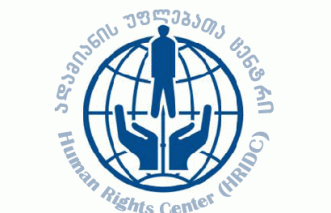Address of Human Rights Center about Discriminatory Conditions of One Part of Women Prisoners
July 3, 2015

Human Rights Center welcomes the initiative of the Georgian Government and ongoing legislative process regarding the formation of new edition of article 260 of the Criminal Code. It is fair decision to separate sale of narcotics from purchasing, possessing and transferring. This will contribute to the process for individual determination of sentence.
Unfortunately, the change did not affect the article 262 of CC, which instilled feeling of injustice and protest in women convicts.
Even under the Amnesty Act of 2012, article 262 of CC decreased only 1/3 of sentences of women convicts. It particularly abused those women convicts, who have been serving inadequately long sentences for years based on the article 262 of CC.
Human Rights Center fully shares the opinion of convicts, because if Amnesty canceled punishments under article 260 for everyone, then keeping article 262 in force was illogical.
During visits in Prison N5 for female convicts, the monitoring group of Human rights Center several times met the prisoners who serve the sentence based on article 262 of CC. Before the amnesty, they were sentenced to 30, 25 or even more years of imprisonment. They say that after the 2012 Parliamentary Elections, new government promised them to review articles 260 and 262 of the CC and create an effective internal mechanism for reconsidering the inadequately long sentences. This has been partly implemented.
Unfortunately, the changes have not affected the article 262 of CC and meantime, the Government has not created an effective internal mechanism for reconsidering illegal and ungrounded verdicts yet. Still, the convicts have no possibility for revision of their inadequately long sentences for drug crimes, which violates their fundamental rights.
A fair dissatisfaction of women prisoners is caused by the fact that the President and the Pardon Commission refuses to pardon the prisoners who had served a half or even two thirds of their sentences based on article 262 of CC, before the Parliamentary Elections.
Simultaneously, after 2012 elections, the justice has become more loyal and women prisoners charged by the same articles are sentenced to 3 or 4 years imprisonment. The prisoners of this category have already been subject to the amnesty, because of this, the old prisoners have feeling that they are being discriminated.
Based on the above, Human Rights Center calls on:
• The Legal, Human Rights and Civil Integration Committees of the Georgian Parliament to fulfill pre-election promises towards to convicts and make relevant changes to liberalize the criminal justice regarding the revision of the regulation of CC’s article 262; to timely create an effective internal mechanism for reconsidering illegal and ungrounded verdicts.
• President of Georgia and Pardon Commission:
To show more sensitivity towards to women prisoners, who, based on article 262 of CC, have been serving inadequately long sentences for years and do not have possibility to have their illegal and ungrounded verdicts revised.
Human Rights Center
This article was published within the frameworks of the project Monitoring State of Women and Juvenile Prisoners in Georgia which is implemented by Human Rights Center in partnership with Office of Public Defender of Georgia, by the financial support of Embassy of Bulgaria.
The article does not necessarily reflect the views of the donor. Human Rights Center bears sole responsibility for the content of the report.
News
December 13, 2023
Ethnic minorities outside the peace dialogue
November 6, 2023
‘Peace’ agenda of political parties
Popular
Articles
February 13, 2024



